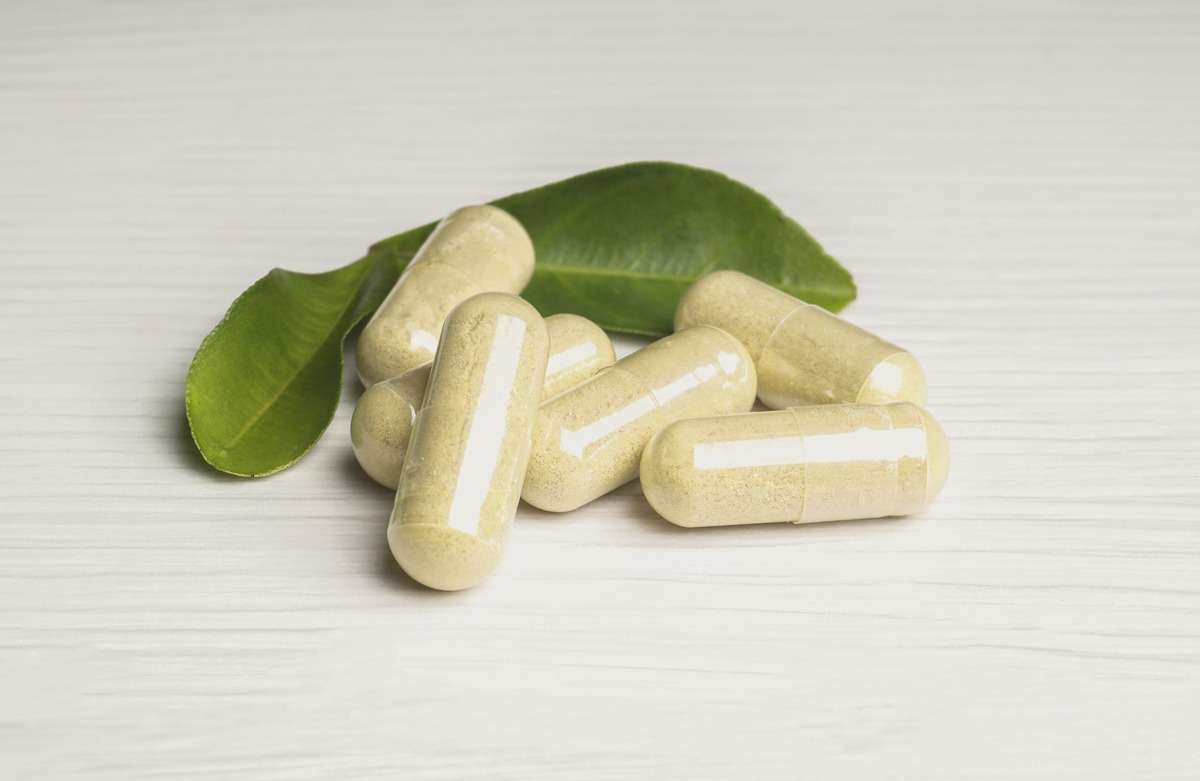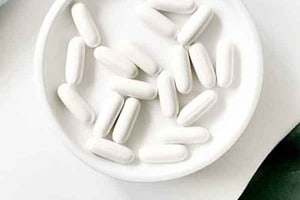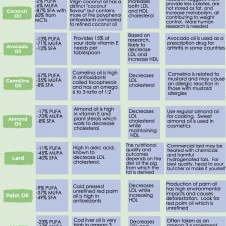We explore the research to answer the question “Do Digestive Enzymes Help With Bloating?” and discuss whether or not digestive enzyme supplements are right for you.

With the increased interest in all things gut health in the wellness world, it’s no surprise that digestive enzymes have quickly taken up space as the next big thing to help keep your digestion in check and treat bloating. In fact, the digestive enzyme supplement market is expected to reach 1.6 billion dollars worldwide by 2025.
Given this increased demand for digestive enzyme supplements, should we all be pinning to add digestive enzymes into our supplement routine to prevent bloating? We dive into the research to determine if digestive enzymes help with bloating and whether or not you should be taking one.
What Are Digestive Enzymes?
First things first, what are digestive enzymes anyway?
Digestive enzymes are proteins that help to break down and metabolize the foods we eat. While you may have come to learn about digestive enzymes in their supplemental form, our body is actually fully equipped with its own digestive enzymes. In fact, there are three main digestive enzymes in the body that target and break down specific macronutrients into their smaller building blocks.
Amylase is responsible for breaking down carbohydrates and starches into simple sugars. Amylase is primarily found in the saliva where upwards of 50% of starch is digested. Notice how when you eat a piece of bread it becomes sweeter the longer you chew it? This is the amylase in your saliva at work breaking down the bread into simple sugars.
Protease breaks down protein into amino acids and is found in the pancreas, stomach, and intestines.
Lipase breaks down dietary fat into free fatty acids and is important for the absorption of essential fat soluble vitamins including vitamins A, D, E, and K.

In addition to the digestive enzymes we naturally produce in the body, the foods we eat can also provide naturally occurring digestive enzymes. For example, pineapple contains the digestive enzyme bromelain which breaks down protein into amino acids. This is also why pineapple juice is often used in marinades to tenderize meat. On the other hand, bananas contain the enzymes amylase and glucosidases which break down carbohydrates. This explains why we throw super ripe bananas into banana bread because as bananas ripen, the enzymes increase their activity and break down the carbohydrates into simple (sweeter) sugars.
With that said, our bodies along with the foods we eat provide us with the digestive enzymes needed to metabolize and absorb food. If we were not equipped with our own naturally occurring digestive enzymes, our food would just flow right through us undigested and unabsorbed which would be no bueno. But in what case does someone need additional digestive enzyme supplements to help break down food?
Digestive Enzyme Deficiency
Given that our bodies naturally produce digestive enzymes, the foods we eat are easily and effectively digested and absorbed without the need for supplemental help. However, a digestive enzyme supplement may be required in the event of a diagnosed digestive enzyme deficiency. Without adequate digestive enzymes in our system, food is not properly digested resulting in uncomfortable digestive symptoms such as bloating, stomach pain, gas, and diarrhea. Not to mention, poor digestion of nutrients may also cause weight loss and malnutrition.
Common causes of digestive enzyme deficiency include conditions that prevent the pancreas from producing the appropriate quantities of enzymes. This includes chronic pancreatitis, pancreatic cancer or cysts, pancreatic surgery, cystic fibrosis, diabetes, and long term alcohol abuse. So unless you have been diagnosed with a serious illness or digestive disorder, you can probably pass on the digestive enzyme supplements.
But what about the more commonly used digestive enzyme supplements on the market like Lactaid and Beano? Do you need to be diagnosed with a deficiency to use them? Let’s find out.
Digestive Enzyme Supplements
There are currently two kinds of digestive enzyme supplements on the market – prescription-based and over-the-counter supplements. Prescription-based digestive enzymes are prescribed to treat digestive enzyme deficiencies, whereas over-the-counter supplements can be purchased by anyone – with or without a diagnosed condition. Two of the most common over-the-counter digestive enzyme supplements include Lactaid and Beano.
Lactaid

We all have those friends (or maybe we are those friends) who, despite being lactose intolerant, can’t resist indulging in a few slices of cheese pizza or a creamy milkshake. Luckily, lactaid tables provide the lactose enzyme needed to easily and painlessly digest the lactose-rich foods. Popping a tablet or two before eating has saved millions of dairy lovers from long days of stomach cramping, bloating, nausea and frequent trips to the bathroom.
Beano

Beano is the commercial name for the enzyme alpha-galactosidase and is responsible for breaking down complex carbs called oligosaccharides. These types of carbs are found in foods like legumes, as well as some fruits, vegetables, grains, and nuts. For some people who are more sensitive to oligosaccharides, these foods can be difficult to digest and often cause gas and bloating. This is why taking a Beano supplement before eating a hearty bowl of bean chilli or a plate of roasted Brussel sprouts can offer relief by breaking down oligosaccharides into easier to digest simple sugars.
Do Digestive Enzymes Help With Bloating?
While bloating is very common, with approximately 13% of Americans experiencing bloating regularly, are digestive enzymes the magical cure to prevent and treat the discomfort of bloating? Well, yes and no. If you have a diagnosed enzyme deficiency or digestive disorder, then digestive enzymes can help to relieve much of the bloating, cramping, and pain that results from undigested food.
For example, if you have diagnosed exocrine pancreatic insufficiency (EPI), a condition resulting in the inability to properly digest and absorb food, then prescribed digestive enzymes would certainly help to reduce bloating. Similarly, lactose supplements (like Lactaid) have been shown to be effective in reducing bloating and digestive discomfort in individuals who are lactose intolerant. Research has also shown that individuals with Irritable Bowel Syndrome (IBS) who take a Beano supplement with a high carb meal also experienced decreased bloating.

There is also new exciting research pointing to the possible benefit of digestive enzymes for individuals with Celiac disease who (intentionally or unintentionally) consume small amounts of gluten-containing foods. These digestive enzymes may help to effectively break down gluten and prevent damage to the small intestine. However, the research in this area is still in its early stages and is not yet conclusive – so be weary of any digestive enzyme supplement being marketed towards those with Celiac disease as they may cause more harm than good.
While there is research supporting the use of digestive enzymes for bloating, it’s important to note that the bloating in these cases is secondary to a diagnosed condition, intolerance, or sensitivity. It’s not just your run of the mill bloating after drinking one too many alcoholic bevys or indulging in a few extra slices of pizza.
With that said, if you do not have a digestive enzyme deficiency or known intolerance, then supplementing with digestive enzymes will not do much to help prevent or reduce bloating. Keep in mind that bloating can be caused by a wide range of factors from eating too much or too quickly, to menstruation, to more serious digestive disorders like Celiac disease or IBS. Consuming more digestive enzymes in addition to the fully functional digestive enzymes you already have on board will do nothing to address the underlying cause of your bloating and won’t provide a band-aid solution either. But if you suspect that you may have an intolerance or a digestive enzyme deficiency, be sure to speak to your doctor to confirm your diagnosis before taking any supplements.
Is There Any Harm in Taking Digestive Enzymes?
If you are an otherwise healthy individual, the risk of true harm is low. However, taking digestive enzymes without a deficiency could actually cause the exact symptoms you were trying to relieve such as nausea, diarrhea, and bloating. On rare occasions, digestive enzymes can occasionally cause allergic reactions causing itching, rash, stomach pain or more severe symptoms. Mostly, digestive enzymes will just drain your wallet as they can be expensive and often recommend taking multiple tablets per meal.

In addition, many digestive enzyme supplements are not well regulated or well studied. Consequently, many do not contain clinically significant levels of digestive enzymes compared to prescription-based digestive enzymes. In other words – you don’t actually know how much (or how little) digestive enzymes you are getting when popping an over-the-counter enzyme supplement. With that said, unless you are purchasing Lactaid or Beano (both of which are supported by research), be weary of any outlandish claims made by digestive enzyme supplements. To learn more about supplement safety, we’ve written all about how to choose the right supplement to help keep you safe (and not waste your money).
It’s also worth noting that many digestive enzymes can also interact with medication. For example, the bromelain enzyme has anti-clotting properties making it dangerous for individuals taking blood thinners. It is therefore important to speak to your doctor before taking any new digestive enzyme supplement (or any supplement for that matter) to ensure that it is safe for consumption.
Bottom Line
In conclusion, do digestive enzymes help with bloating? As we’ve discussed, the average healthy person without a diagnosed digestive enzyme deficiency or intolerance will likely not experience decreased bloating from taking digestive enzyme supplements. In some cases, you may even experience a worsening of symptoms if you don’t do the investigative work to determine the root cause of your digestive discomfort.
However, if you determine that your bloating is caused by a lactose intolerance or an inability to digest certain complex carbs, then your bloating may benefit from the use of a Lactaid or Beano supplement, respectively. Otherwise, I would suggest you exercise caution when trialing other digestive enzyme supplements as not only are they expensive, but they are also not well regulated or supported by research and, in worse cases, may increase your symptoms.
Contribution by: Joeie Schwartz, MPH (c)
Edited by: Giselle Segovia RD, MHSc
More Blog Posts You Might Like
- Is Shakeology Worth It?
- Does Drinking Water While Eating Reduce Digestion?
- Can the Keto Diet Cure Your Digestion Problems?
- How to Stop Stomach Cramps and Pain
- Vegan Diet and Bloating
Updated on October 4th, 2021

Abbey Sharp is a Registered Dietitian (RD), regulated by the Ontario College of Dietitians. She is a mom, YouTuber, Blogger, award winning cookbook author, media coach specializing in food and nutrition influencers, and a frequent contributor to national publications like Healthline and on national broadcast TV shows.







Leave a Comment